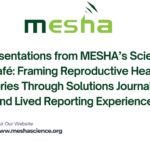Seven months after the World Health Organisation (WHO) approved the dapivirine vaginal ring as a new choice for HIV prevention for women at high risk of infection, researchers are now testing a two-in-one method that can prevent both HIV and pregnancy.
The revelation was made during the 11th IAS Conference on HIV Science, which took place virtually from July 18-21, 2021, by Dr Sharon Hillier of the University of Pittburg. IAS Conference on HIV Science is the world’s most influential meeting on HIV research and its applications.
Presenting the IAS conference updates to journalists during a Mesha science café in Nairobi on August 27, Prof Kenneth Ngure, the Chair, Department of Community Health at Jomo Kenyatta University of Agriculture and Technology (JKUAT), said the new product being tested will be a 90-day dual-purpose vaginal ring, and is being developed by the nonprofit International Partnership for Microbicides (IPM).
According to him, high rates of HIV transmission and unintended pregnancy in some countries spurred the search for prevention methods that could prevent both.
Prof Ngure says the best thing about the ring, which contains dapivirine and levonorgestrel (contraceptive), is that results presented at the conference reported safety and
potential to offer women a discreet and long-acting product to simultaneously meet two major sexual and reproductive health needs, as well as offer greater convenience.
The ring builds on similar technology used for IPM’s monthly dapivirine-only ring, which is the first long-acting, self-initiated, female-only HIV prevention method that has
been shown to safely reduce the risk of HIV infection among sexually active women.
Though the ring currently lasts a month, IPM is also testing one that can last for three months, and results presented by Dr Hillier at the IAS meeting showed it had achieved 3-4 fold higher drug concentrations in the cervix, which could translate to even better HIV protection compared to the monthly ring.
“This milestone marks an important step towards expanding the number of biomedical HIV prevention and contraceptive options available to women. But be ready to wait a little bit longer before the products get to the market because research takes time,” she said.
The dapivirine vaginal ring is similar to Nuvaring, a contraceptive ring that many people are familiar with, which releases hormones to the female reproductive tract to prevent pregnancy. Women can insert the ring themselves and, for a month, it slowly releases dapivirine to protect against HIV infection.
Available information shows that whereas the monthly vaginal ring for HIV prevention only contains 25mg of dapivirine, the dual-purpose ring contains 200mg of dapivirine to allow for its extended release over three months, as well as 320mg of levonorgestrel, a synthetic progestin used in many contraceptives, either alone or in combination with estrogen.
Since the product is still in early-stage development, Ngure says people should expect it in the market in the next few years.
The dapivirine-contraceptive ring is not the only multipurpose prevention technology that is being developed. Other technologies are being developed to prevent unwanted pregnancy and a broad spectrum of STIs. For example, the Population Council is developing a vaginal insert to lower vaginal acidity (pH). This will inactivate sperm and bacteria.
A variant on this product also contains an agent that stops HIV from entering cells.
Altogether, 24 products are in development, most still in pre-clinical laboratory testing, according to the Initiative for Multipurpose Prevention Technologies.
By Njeri Murigi






